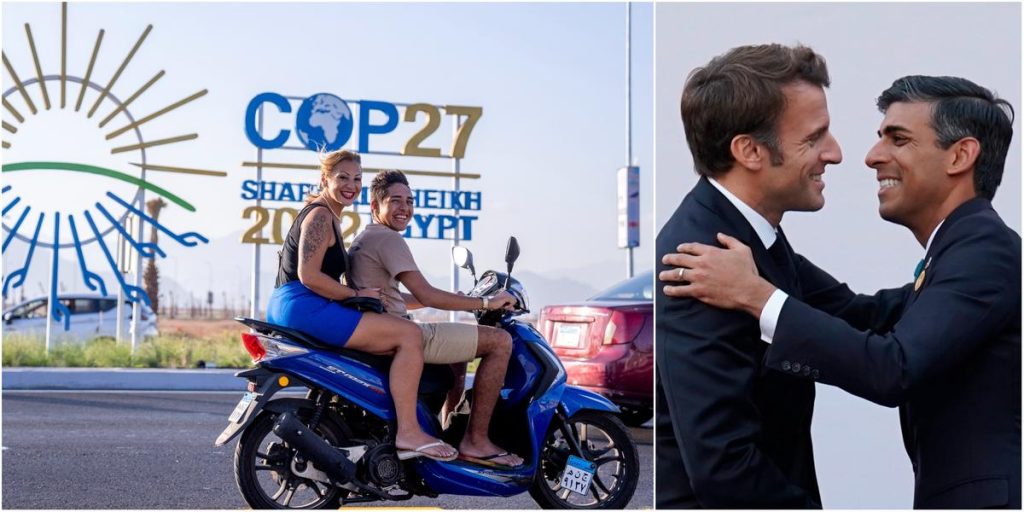Every year for the past 30 years, with a few exceptions, the United Nations has held climate summits to curb global warming. In some of them, important agreements such as the Kyoto Agreement in 1997 and the Paris Agreement in 2015 have been taken and concluded.
In the latter period, countries signed up to a goal of limiting warming to less than two degrees, preferably less than 1.5 degrees, compared to pre-industrial levels.
There has been criticism that Egypt is hosting this meeting. Why?
Mainly, criticism is directed towards the Egyptian regime, for example when it comes to human rights. Some believe that some people who are not comfortable with the board are not accredited and therefore not allowed to attend the meeting. And then it’s about non-state actors.
But there is also concern about how anti-crowd protests should be dealt with — that is, any civil disobedience should be unacceptably punished.
Egypt also announced its Paris Agreement targets a year late. They only arrived this summer. The country is heavily reliant on gas and other fossil fuels – so some believe they have low climate ambitions.
The meeting moves between continents, and now it’s Africa’s turn. Then those countries put their trust in Egypt. They hope that more space will be given to issues important to Africa.
Which countries are participating in COP27?
Around 200 countries covering everything from major players like the US, China and India to small island nations. Sweden will be represented, but the entire EU has adopted a common position.
What will happen during COP27?
Several countries presented their national targets before last year’s meeting in Glasgow. Many more have cheated since then, and perhaps the last will come during this meeting.
There may be debates about whether emissions should be tightened further. Especially the UN that came out at the end of October. The report then states that the targets countries have pledged will lead to at least 2.4 degrees of warming instead of 1.5 degrees on average.
And also who will pay for the consequences of climate change.
Which countries are more willing to set climate targets and which countries are more reluctant?
The EU, USA and the UK are generally singled out as some of the countries with the highest targets for reducing emissions, while Australia and Japan are generally cited as the least ambitious.
Which countries play the most important role?
This is a global problem, so emissions must be drastically reduced everywhere. But the United States and China together account for 40 percent of greenhouse gas emissions, so it’s clear that meeting their targets is important. India is ranked third.
The climate summit in Sharm el-Sheikh began on Sunday and will last for about two weeks. Image: Jawad Barsa
Are you delivering on the promises of COP26 in Glasgow?
As far as long-term goals are concerned, for example reducing coal use, we can’t say yet.
One promise emphasized in Glasgow was that the industrialized countries promised to give developing countries US$100 billion a year. The money will go to both mitigation, but also adaptation and remediation. In Glasgow, rich countries pledged even more money.
But now the figures for 2020 show that huge sums are still missing to fulfill the initial pledges, and much of what has been disbursed is in the form of loans. Aid for other purposes has also been reclassified as climate money. So countries with historical responsibility for emissions must now show that the promises are real
What will be the outcome of COP27?
They get funding, 100 billion a year.
There may also be demands to tighten emissions targets, mainly from those that are hardest hit – such as small island nations that are already affected today.
But it remains to be seen whether the talks will move forward despite geopolitical tensions, the energy crisis and the pandemic.
Eventually there will be some kind of document, but probably not in the class of the Kyoto Protocol or the Paris Agreement.
Are resolutions binding?
Not really. Countries that have signed the Paris Agreement agree to reduce emissions below 2 degrees. But they can submit their national targets if they want and change them if they want.
Now you can get all the news and exciting reports directly to your phone by clicking the follow button next to the weather tag. On mobile you can find it below the article and on the site at the top right of the article.
read more: Researchers: Climate is the most important factor in the meeting
read more: The world is no closer to an important goal
read more: GP’s images from the climate meeting in Glasgow
Want to learn more about how GP works with quality journalism? Read our Code of Conduct Here.

“Passionate beer ninja. Extreme problem solver. Thinker. Professional web fan. Avid communicator. Hardcore troublemaker.”








More Stories
Mockingly mocking in the UK is illegal
Harvesting early and small peas in Britain
Saab is supplying the British Army with a new generation of Arthur radar